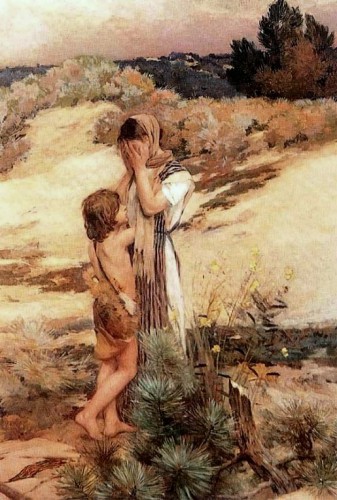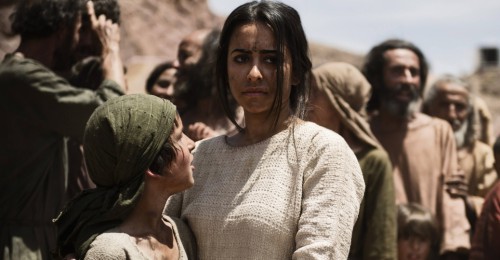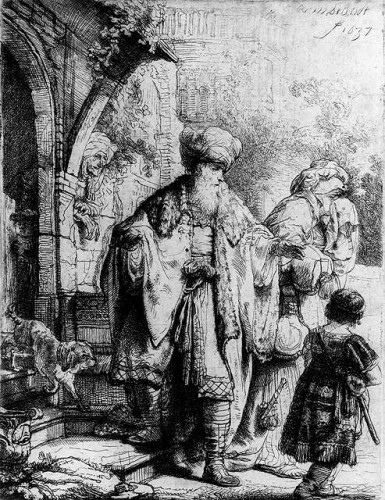
So Abraham rose early in the morning, and took bread and a skin of water, and gave it to Hagar, putting it on her shoulder, along with the child, and sent her away. And she departed, and wandered about in the wilderness of Beer-sheba. When the water in the skin was gone, she cast the child under one of the bushes. Then she went and sat down opposite him a good way off, about the distance of a bowshot; for she said, “Do not let me look on the death of the child.” And as she sat opposite him, she lifted up her voice and wept. (Gen 21:14-16)
 Perhaps you’re familiar with this part of the Genesis account. At his wife Sarah’s urging, Abraham casts out his servant Hagar and their/his first born Ishmael, only a baby, into the wilderness with nothing but some bread and water. Martin Luther writes, “The destitute mother and her destitute son are cast out from the true father’s estate, and of all his possessions they carry away nothing except a little bread and water, which no doubt was food and drink for only a few days” (36). They are cast out of comfort and provision into desert and wilderness. The scene here should conjure up another image, one just like it that happened about 17 chapters earlier in the story in Genesis–an event that solidified the deleterious effects of one bad decision for the rest of humanity.
Perhaps you’re familiar with this part of the Genesis account. At his wife Sarah’s urging, Abraham casts out his servant Hagar and their/his first born Ishmael, only a baby, into the wilderness with nothing but some bread and water. Martin Luther writes, “The destitute mother and her destitute son are cast out from the true father’s estate, and of all his possessions they carry away nothing except a little bread and water, which no doubt was food and drink for only a few days” (36). They are cast out of comfort and provision into desert and wilderness. The scene here should conjure up another image, one just like it that happened about 17 chapters earlier in the story in Genesis–an event that solidified the deleterious effects of one bad decision for the rest of humanity.
As Adam and Eve were cast-out of the Garden, I could imagine them standing on the parched soil—the very same ground with which and against which they will toil—and noticing the dust clouds kicked up by the slightest move of the foot. I could imagine them turning to look back at their former home and seeing the cherubim with their flaming swords preventing them from reentry. Adam and Eve—and with them the rest of humanity—were cast out of paradise.
So, too, with Hagar and Ishmael as they headed off–Hagar carrying some bread and water on one shoulder, and her son on the other, her feet stepping on arid, sun parched land, dust kicking up as she walked and as her robes trailed behind her. Every step reinforcing the fact that what she had known was no longer. There would be no reentry to Abraham’s house, just as there would be no reentry to the Garden. The doors had been shut and locked.
By the word of the command (not only of Sarah and of Abraham but of God) Hagar and Ishmael were cast-out, and seemingly left for naught. As the bread and water run out, Hagar and Ishmael are brought low, low enough to be staring death in the face.
The text tells us, “When the water in the skin was gone, she cast the child under one of the bushes. Then she went and sat down opposite him a good way off, about the distance of a bowshot; for she said, ‘Do not let me look on the death of the child.’ And as she sat opposite him, she lifted up her voice and wept.”
They have lost everything. They are empty handed and barely alive, nearly dead. The fact that Ishmael is technically Abraham’s first born son means nothing now—he has no “rights” to anything. Everything for Ishmael hinged on him being Abraham’s son by birth, but now he and his mother had been “disowned.” His “birth-right” now means nothing.

Hagar finds that she can barely look at her son. She both cannot bare the sight of him dying nor can she see clearly through her weeping. Hagar is, according to Luther, “despairing to the point of death” (48); she is helpless to change the situation because she is in such a state of mental and spiritual turmoil that she can’t think straight. The command has stripped both Ishmael and Hagar of all they once had, even their very lives; they are at the end of their rope.
So it is with us. The Law casts us out. It dismantles our “rights,” our “claims because of birth,” our “entitlements.” It demands everything but gives nothing. The Law, when we take it seriously, reduces us to (near) despair, to (prepare to) embrace death as our only option. No matter who we are, what our last name is, what we are capable of doing, or how smart we are, it is nothing in light of the command.
We cannot stand on our own two feet and demonstrate our inherent worth before God and lay claim to our inheritance. Because we cannot stand up under the burden of the command, instead we walk as far as our strength will take us, until the water runs out, and we lay down in whatever shade we can muster and prepare to die. Luther writes, “This self-confidence is such a poisonous evil and such a pernicious pest that it cannot be killed except through utter despair, so that a man, divested of everything he possesses, all but despairs of God and His grace and feels himself cast away by God” (50).
But there is good news…even for those who have been cast-out…Because our God is the God of the Cast-Out.
God is the Word of Promise, Casted-Out for us “The Cast-Outs” the Heirs of the Promise
“And God heard the voice of the boy; and the angel of God called to Hagar from heaven, and said to her, “What troubles you, Hagar? Do not be afraid; for God has heard the voice of the boy where he is. Come, lift up the boy and hold him fast with your hand, for I will make a great nation of him.” Then God opened her eyes and she saw a well of water. She went, and filled the skin with water, and gave the boy a drink. God was with the boy, and he grew up; he lived in the wilderness, and became an expert with the bow. He lived in the wilderness of Paran; and his mother got a wife for him from the land of Egypt.” (Gen 21:17-21)
 Turns out it is not possible to be so cast-out as to be out of divine earshot. So it is with God, when we are at our lowest, near total-despairing because of the perceived absence of the presence of God. That is when He is nearest. That is where our proud hearts are replaced with broken hearts, with fleshy hearts, hearts and souls that cry out in groans and moans unintelligible.
Turns out it is not possible to be so cast-out as to be out of divine earshot. So it is with God, when we are at our lowest, near total-despairing because of the perceived absence of the presence of God. That is when He is nearest. That is where our proud hearts are replaced with broken hearts, with fleshy hearts, hearts and souls that cry out in groans and moans unintelligible.
Micah 8:6 reads, “He has told you, O man, what is good; and what does the Lord require of you but to do justice, and to love kindness, and to walk humbly with your God?” Psalm 51:17, “The sacrifices of God are a broken spirit; a broken and contrite heart, O God, you will not despise.” Isaiah 42:3, “…a bruised reed he will not break, and a faintly burning wick he will not quench; he will faithfully bring forth justice.” Luther writes, “To be sure, Ishmael cried with his voice; but it was chiefly the distress of his heart and his contrition that led him to groan from the throat and to heave deep sighs. This music, which seems to us very sad and mournful, pleases God more than any other form of worship, as He says in Isaiah (57:15): ‘I shall dwell with a contrite spirit’” (56).
God hears the (beautiful) groaning of those who now have nothing, and he speaks. And what he speaks is bigger and better than the command that casts out: he speaks the promise. This word (re)creates out of nothing. This word brings life, refreshment. Where the command casts out, the promise gathers in.
God says to Hagar, “Come lift up the boy and hold him fast with your hand, for I will make a great nation of him.” Ishmael will be made into a great nation not because of his birth right, but because of the promise.
Just like his younger brother Isaac, Ishmael is dependent on the promise of God and God fulfilling his promises. And just like Ishmael, we are cast-outs who are dependent on the word of God. “God hears Ishmael in order that this proposition may stand sure and firm, that God is the God of the humble” (Luther 64). The promise is for those who have been, are being, and will be brought low, disinherited, cast out. Having been crushed by the Law, our ears are opened to hear the promise of God. We cry out with empty hands and tear soaked faces.
The Word of the promise of God prevails because the Word of the promise is none other than Jesus Christ: God of very God who was cast-out and forsaken to gather-in and never abandon those who are cast-out and forsaken. Jesus Christ “died for our sins and was raised for our justification” (Rom 4:25); And from the book of Ephesians:
But God, being rich in mercy, because of the great love with which he loved us, even when we were dead in our trespasses, made us alive together with Christ—by grace you have been saved—and raised us up with him and seated us with him in the heavenly places in Christ Jesus, so that in the coming ages he might show the immeasurable riches of his grace in kindness toward us in Christ Jesus. For by grace you have been saved through faith. And this is not your own doing; it is the gift of God, not a result of works, so that no one may boast (2:4-9).
 The life, death, resurrection, and ascension of Jesus Christ is a resounding “no”, a final cessation to our being cast-outs. We are, by faith, the sons and daughters of God—being adopted by God through Christ by the power of the Holy Spirit, as we read from the pen of Paul in the book of Galatians, Chapter 3, “for in Christ Jesus you are all sons of God, through faith. For as many of you as were baptized into Christ have put on Christ. There is neither Jew nor Greek, there is neither slave nor free, there is no male and female, for you are all one in Christ Jesus. And if you are Christ’s, then you are Abraham’s offspring, heirs according to promise.”
The life, death, resurrection, and ascension of Jesus Christ is a resounding “no”, a final cessation to our being cast-outs. We are, by faith, the sons and daughters of God—being adopted by God through Christ by the power of the Holy Spirit, as we read from the pen of Paul in the book of Galatians, Chapter 3, “for in Christ Jesus you are all sons of God, through faith. For as many of you as were baptized into Christ have put on Christ. There is neither Jew nor Greek, there is neither slave nor free, there is no male and female, for you are all one in Christ Jesus. And if you are Christ’s, then you are Abraham’s offspring, heirs according to promise.”
Our God is the God of the promise; our God is the God of the Cast-Out; our God is the Word of Promise whispered from the beginning of the ages that gathers to himself (by His Word) those who have been cast-out (and have heard His (this) Word) and by His word alone, raises them up into new life, new, full, and abundant (refreshed and sustained) life in Him by faith in Him apart from all works.
(The above was adapted from this sermon.)

COMMENTS
Leave a Reply












